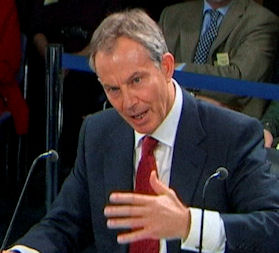Tony Blair at the Iraq inquiry: I have no regrets
Tony Blair passes up the chance to apologise directly for the Iraq war to the Chilcot inquiry. Instead he admits he was sorry the action had been “divisive” as Political Editor Gary Gibbon reports.

At the end of his long-awaited appearance, Tony Blair was asked by chairman Sir John Chilcot if he had any regrets.
He said: “Responsibility, but not a regret for removing Saddam Hussein.”
But he added that he was “sorry” the war had been divisive.
He was interrupted by members of the audience at this point, with one person shouting “you’re a liar” and another calling him a murderer.
But Mr Blair continued: “I think he (Saddam) was a monster. I believe he threatened not just the region but the world and in the circumstances we faced I think, even if you look back now, it was better to deal with this threat, to remove him from office, and I do genuinely believe that the world is safer as a result.”

Tony Blair at the Chilcot Inquiry on the Iraq war
He added: “I don’t think I refused a request for money or for equipment at any point in the time that I was prime minister.
I think he (Saddam) was a monster. I believe he threatened not just the region but the world. Tony Blair
Earlier, he was asked if the “great suffering” that followed the invasion was too high a price for removing Saddam. He said: “It’s too early to say right now whether the Iraqi democracy will take root and function effectively.”
But there were hopeful signs. “If you look, for example, at the electricity, you look at income per head, which is several times what it was under Saddam, you look at the money being spent on infrastructure, I think, yes, it was a very, very difficult fight indeed.
“It was always going to be difficult once these external factors came into play, of al-Qaida and Iran but, sure, when you go into a nation-building situation in the future, I think we will be far better prepared and better educated than we were then.”
Mr Blair said the view of Iraqis was important.
He said: “If we’re talking about was it worth it in terms of the Iraqis themselves, if you look at the latest information from the Brookings Institute and the polls that they’re doing about the right direction, wrong direction for their country, they’re actually upbeat about the future.
“If you look at whether they believe security and services are getting better, a majority of them think they are, despite all the trouble, despite the fact these terrorists carry on.”
Infant mortality had improved dramatically, from 130 under-5s per 1,000 dying in Saddam’s Iraq to 40 today.
He added: “If you ask the majority of Iraqis today, would you really prefer with all the challenges that lie ahead, to be back under Saddam, I think you’d get a pretty overwhelming answer to that question.”
Inquiry member Professor Sir Lawrence Freedman referred to the civilian deaths in Iraq after the 2003 invasion and asked Mr Blair: “What would you say to the Iraqi people that could explain what they must have felt, a sense of let-down at what the coalition had been able to do for them?”
The former prime minister replied: “The coalition forces weren’t the ones doing the killing. The ones doing the killing were the terrorists, the sectarians, and they were doing it quite deliberately to stop us making the progress we wanted to make.
“So my attitude, and I took this line very, very strongly with people, when you say, ‘isn’t it terrible that the death toll went that high?’, is yes. it’s terrible. But the first question to ask is who was killing them, and this turned out to be precisely the same people that we were trying to fight everywhere, and our responsibility was to stick in there and see it through.”